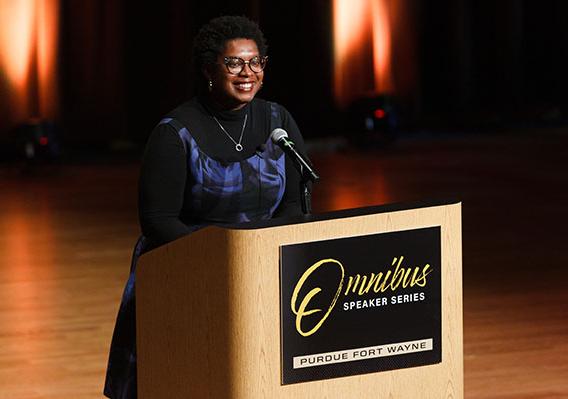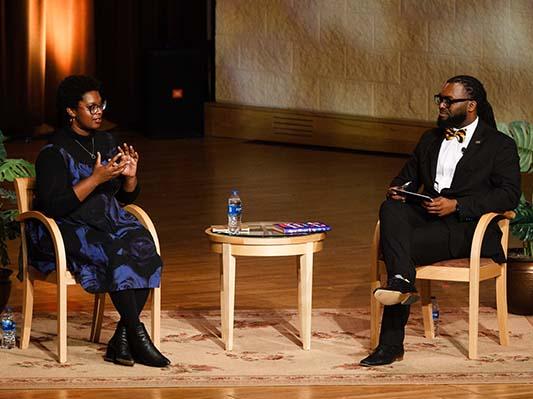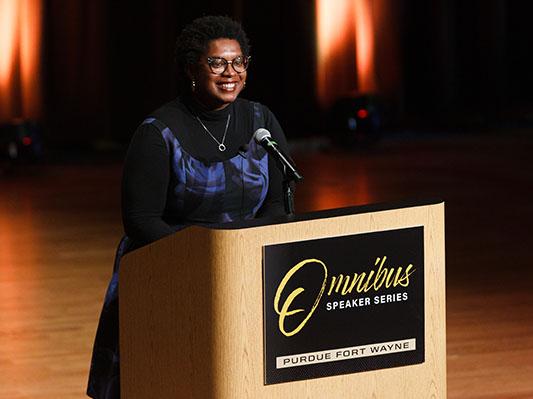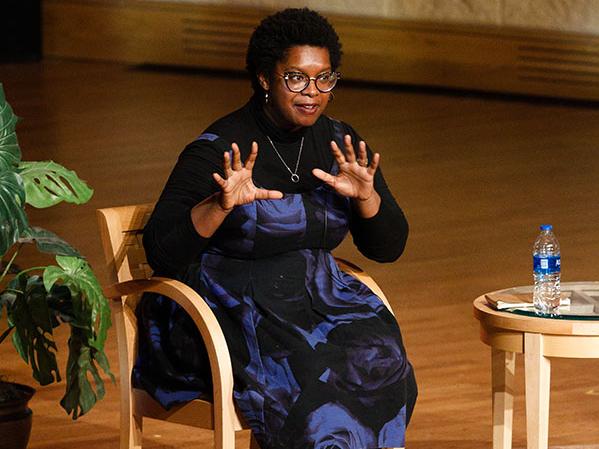
PFW Story
Imagination and Advocacy
“There will always be need, but I think that we should imagine a world where there isn’t, anyway.”
Ashley C. Ford, Purdue University Fort Wayne’s latest Omnibus series speaker, grew up on the southeast side of Fort Wayne in a time—not too different than today—when that community experienced a lack of investment.
“When I was here, my school was underfunded and under resourced. The side of town I lived on lacked investment form the rest of the city and the community,” Ford said. “I was a child living in that environment, which for the most part—let’s be honest—was kind of fun. What wasn’t fun was not being able to afford sets in the theatre program; not being able to afford uniforms in the music program.
“That lack of investment was not my choice as a child, it was not my fault as a child, but it was my reality. I believe that it was only my reality because of a lack of imagination about what comes from the southeast side of Fort Wayne, Indiana.”
Ford joined the Purdue Fort Wayne community on Thursday afternoon for an intimate discussion with students at Helmke Library and later in the evening for her public presentation and fireside chat that focused on children, their futures, and imagination. A New York Times best-selling author, she also shared stories from her childhood in the Summit City and discussed parts of her memoir, Somebody’s Daughter, with MarTeze Hammonds, Purdue Fort Wayne’s chief diversity officer.

If you’re having issues with your mental health, start by letting that be OK. Start by loving yourself anyway . . . you can be just as good at loving yourself as you’ve been at putting yourself down. It’s just going to take time and practice, like anything else. So, start practicing now.
Hammonds, who knew Ford while she was a student at Ball State University and he was assistant director of the Multicultural Center, welcomed her to the Auer Performance Hall stage and did his best Oprah-style interview after her talk.
Hammonds shared that he and Ford both had fathers who were incarcerated, and asked about her experience and how she advocates for children currently dealing with a similar situation.
“All my mom had ever wanted to be was a mom,” Ford said. “That’s it. That’s what she wanted to be more than anything else. Her ability to be the mother she wanted to be was taken from her. That’s why I try to explain to people that’s it’s easy to say, ‘This is not my problem because these are not my kids,’ but the kids are still innocent,” she continued. “What did they do to deserve a life of lack? Nothing. Helping them may not be what you have to do, but doing it is part of owning your power and giving responsibly. Don’t forget about them.”
Hammonds also asked Ford about mental health in the Black community.
“I have anxiety and generalized depression—but they don’t have me,” she said. “I deal with those things, I struggle with those things, and the thing that I have learned that works for me . . . is knowing that everything that I want for the people I love, I deserve, too.
“If you’re having issues with your mental health, start by letting that be OK,” she continued. “Start by loving yourself anyway; you can be just as good at loving yourself as you’ve been at putting yourself down. It’s just going to take time and practice, like anything else. So, start practicing now.”
Ford also answered questions from students in the university’s Honors Program, ranging from how Ford maintains her sense of self despite increasing recognition and how she stays creative.
“Do what you love to do,” she said in response to the latter. “Nothing is guaranteed, but there are a lot more chances to get your work seen if you’re doing it than if you’re not.”
For more information on Ford and the next Omnibus Speaker Series guest, Monica Lewinsky, visit pfw.edu/omnibus.
For more information on mental health services available to students, visit pfw.edu/care.
###




from the Article




